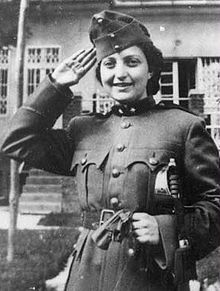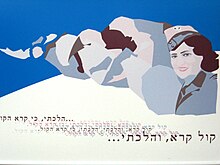Hannah Szenes: Difference between revisions
ClueBot NG (talk | contribs) m Reverting possible vandalism by 59.167.118.165 to version by 184.75.10.82. False positive? Report it. Thanks, ClueBot NG. (1701741) (Bot) |
Jemiscute1 (talk | contribs) No edit summary |
||
| Line 1: | Line 1: | ||
[[Image:HannahSzenes1.jpg|right|thumb|220px|Hannah Szenes in a Hungarian army uniform as a [[Purim]] costume]] |
[[Image:HannahSzenes1.jpg|right|thumb|220px|Hannah Szenes in a Hungarian army uniform as a [[Purim]] costume]] |
||
'''Hannah Szenes''' (often [[Anglicisation|anglicized]] as '''Hannah Senesh''' or '''Chana Senesh'''; {{lang-he|חנה סנש}}; [[Hungarian language|Hungarian]]: Szenes Anikó; July 17, 1921{{spaced ndash}}November 7, 1944) was one of 37 [[Jew]]s from [[Mandatory Palestine]] [[Paratrooper|parachuted]] by the [[British Army]] into [[Yugoslavia]] during the [[Second World War]] to assist in the rescue of [[History of the Jews in Hungary|Hungarian Jews]] about to be deported to the [[Nazi Germany|German]] [[death camp]] at [[Auschwitz concentration camp|Auschwitz]].<ref name=Hecht>Hecht, Ben. ''Perfidy'', first published by |
'''Hannah Szenes''' (often [[Anglicisation|anglicized]] as '''Hannah Senesh''' or '''Chana Senesh'''; {{lang-he|חנה סנש}}; [[Hungarian language|Hungarian]]: Szenes Anikó; July 17, 1921{{spaced ndash}}November 7, 1944) was one of 37 [[Jew]]s from [[Mandatory Palestine]] [[Paratrooper|parachuted]] by the [[British Army]] into [[Yugoslavia]] during the [[Second World War]] to assist in the rescue of [[History of the Jews in Hungary|Hungarian Jews]] about to be deported to the [[Nazi Germany|German]] [[death camp]] at [[Auschwitz concentration camp|Auschwitz]].<ref name=Hecht>Hecht, Ben. ''Perfidy'', first published by |
||
Szenes was arrested at the Hungarian border, then imprisoned and tortured, but refused to reveal details of her mission. She was eventually tried and [[Execution by firing squad|executed by firing squad]].<ref name=Hecht/> She is regarded as a national heroine in [[Israel]], where her poetry is widely known and the headquarters of the [[Zionist youth movement]]s ''Israel Hatzeira'', [[Yad Hana|a kibbutz]] and several streets are named after her. |
|||
== Early life == |
|||
[[File:PikiWiki Israel 7718 Hannah Senesh and her brother.JPG|thumb|right|Hannah Szenes and her brother, [[Budapest]], 1924]] |
|||
Szenes was born on July 17, 1921, to an assimilated Jewish family in [[Hungary]]. Her father, [[Béla Szenes]], a journalist and playwright, died when she was six years old. She continued to live with her mother, Catherine, and her brother, [[György Szenes|György]] (Giora). |
|||
She enrolled in a Protestant private school for girls that also accepted [[Catholicism|Catholic]] and Jewish pupils; most of those of the Jewish faith had to pay three times the amount Catholics paid. However, Senesh only had to pay twice the regular tuition because she was considered a "Gifted Student". This, along with the realization that the situation of the Jews in Hungary was becoming precarious, prompted Szenes to embrace [[Zionism]], and she joined ''Maccabea'', a Hungarian [[Zionist youth movement|Zionist students organization]]. |
|||
==Immigrating to Nahalal== |
|||
Szenes graduated in 1939 and decided to emigrate to what was then the [[British Mandate of Palestine]] in order to study in the Girls' Agricultural School at [[Nahalal]]. In 1941, she joined [[Kibbutz]] [[Sdot Yam]] and then joined the [[Haganah]], the paramilitary group that laid the foundation of the [[Israel Defense Forces]]. In 1943, she enlisted in the [[British Army]] in the [[Women's Auxiliary Air Force]] as an Aircraftwoman 2nd Class and began her training in [[Egypt]] as a paratrooper for the British [[Special Operations Executive]] (SOE). |
|||
==Arrest and torture== |
==Arrest and torture== |
||
On March 14, 1944, she and colleagues [[Yoel Palgi]] and [[Peretz Goldstein]]<ref name=Hecht/> were parachuted into [[Yugoslavia]] and joined a [[Partisans (Yugoslavia)|partisan group]]. After landing, they learned the Germans had already occupied Hungary, so the men decided to call off the mission as too dangerous.<ref name=Hecht/> Szenes continued on and headed for the Hungarian border. At the border, she and her companions were arrested by Hungarian gendarmes, who found her British military transmitter, used to communicate with the SOE and other partisans. Hannah was taken to a prison, stripped, tied to a chair, then whipped and clubbed for three days. The guards wanted to know the code for her transmitter so they could find out who the parachutists were and misdirect others. Transferred to a Budapest prison, Hannah was repeatedly interrogated and cruelly tortured, but she only revealed her name and refused to provide the transmitter code, even when her mother was also arrested. They threatened to kill her mother if she did not cooperate, but Hannah held firm (and probably saved her mother's life as a result).<ref name=Hecht/> |
On March 14, 1944, she and colleagues [[Yoel Palgi]] and [[Peretz Goldstein]]<ref name=Hecht/> were parachuted into [[Yugoslavia]] and joined a [[Partisans (Yugoslavia)|partisan group]]. After landing, they learned the Germans had already occupied Hungary, so the men decided to call off the mission as too dangerous.<ref name=Hecht/> Szenes continued on and headed for the Hungarian border. At the border, she and her companions were arrested by Hungarian gendarmes, who found her British military transmitter, used to communicate with the SOE and other partisans. Hannah was taken to a prison, stripped, tied to a chair, then whipped and clubbed for three days. The guards wanted to know the code for her transmitter so they could find out who the parachutists were and misdirect others. Transferred to a Budapest prison, Hannah was repeatedly interrogated and cruelly tortured, but she only revealed her name and refused to provide the transmitter code, even when her mother was also arrested. They threatened to kill her mother if she did not cooperate, but Hannah held firm (and probably saved her mother's life as a result).<ref name=Hecht/> |
||
Revision as of 02:33, 12 August 2013

Hannah Szenes (often anglicized as Hannah Senesh or Chana Senesh; Hebrew: חנה סנש; Hungarian: Szenes Anikó; July 17, 1921 – November 7, 1944) was one of 37 Jews from Mandatory Palestine parachuted by the British Army into Yugoslavia during the Second World War to assist in the rescue of Hungarian Jews about to be deported to the German death camp at Auschwitz.Cite error: A <ref> tag is missing the closing </ref> (see the help page). She kept diary entries until her last day, November 7, 1944 when she was executed by a German firing squad. One of them read: "In the month of July, I shall be twenty-three/I played a number in a game/The dice have rolled. I have lost," and another: "I loved the warm sunlight."[1]

Her diary was published in Hebrew in 1946. Her remains were brought to Israel in 1950 and buried in the cemetery on Mount Herzl, Jerusalem. Her tombstone was brought to Israel in November 2007 and placed in Sdot Yam.[2]
During the trial of Rudolf Kastner, Hannah's mother, Catherina Senesh, testified that during the time her daughter was imprisoned, Kastner's people had advised her not to obtain a lawyer for her daughter. Further, she recalled a conversation with Kastner after the war, telling him, "I don't say that you could have saved my daughter Hannah, but that you didn't try - it makes it harder for me that nothing was done."[3]
After the Cold War, a Hungarian military court officially exonerated her. Her kin in Israel were informed on November 5, 1993.
Poetry, songs and plays


Szenes was a poet and playwright, writing both in Hungarian and Hebrew. The following are four of her better known poems. The best known of these is Halikha LeKesariya ("A Walk to Caesarea"), commonly known as Eli, Eli ("My God, My God"). The well-known melody was composed by David Zahavi. Many singers have sung it, including Ofra Haza, Regina Spektor, and Sophie Milman. It was used to close some versions of the film Schindler's List:
- My God, My God, I pray that these things never end,
- The sand and the sea,
- The rustle of the waters,
- Lightning of the Heavens,
- The prayer of Man.
- אלי, אלי, שלא יגמר לעולם
- החול והים
- רשרוש של המים
- ברק השמים
- תפילת האדם
- The voice called, and I went.
- I went, because the voice called.
The following lines are from the last poem she wrote, "Ashrei Hagafrur", after she was parachuted into a partisan camp in Yugoslavia:
- ,אַשְׁרֵי הַגַּפְרוּר שֶׁנִּשְׂרַף וְהִצִּית לֶהָבוֹת
- .אַשְׁרֵי הַלְּהָבָה שֶׁבָּעֲרָה בְּסִתְרֵי לְבָבוֹת
- ...אַשְׁרֵי הַלְבָבוֹת שֶׁיָדְעוּ לַחְדוֹל בְּכָבוֹד
- .אַשְׁרֵי הַגַּפְרוּר שֶׁנִּשְׂרַף וְהִצִּית לֶהָבוֹת
- Blessed is the match consumed in kindling flame.
- Blessed is the flame that burns in the secret fastness of the heart.
- Blessed is the heart with strength to stop its beating for honor's sake.
- Blessed is the match consumed in kindling flame.
The following lines were found in Hanna's death cell after her execution:
- One - two - three... eight feet long
- Two strides across, the rest is dark...
- Life is a fleeting question mark
- One - two - three... maybe another week.
- Or the next month may still find me here,
- But death, I feel is very near.
- I could have been 23 next July
- I gambled on what mattered most,
- The dice were cast. I lost.
In popular culture
A film about Szenes' life entitled Hanna's War was released in 1988 and directed by Menahem Golan. She was portrayed by actress Maruschka Detmers.
See also
References
- ^ Cite error: The named reference
Hechtwas invoked but never defined (see the help page). - ^ Tombstone of WWII poet and spy Hannah Szenes arrives in Israel Haaretz, 25 November 2007
- ^ Hecht, Ben. Perfidy. 1961, p. 132
Bibliography
- Atkinson, Linda. In Kindling Flame: the Story of Hannah Senesh. Beech Tree Books, 1992.
- Hay, Peter. Ordinary Heroes: Chana Szenes and the Dream of Zion. G.P. Putnam's Sons, 1986.
- Ransom, Candice F. So Young to Die: the Story of Hannah Senesh. Scholastic, 1993.
- Senesh, Hannah, and Marge Piercy (foreword). Hannah Senesh: Her Life and Diary. Jewish Lights Publishing, 2004.
External links
- Video Lecture by Dr. Henry Abramson on Hannah Szenes
- Teacher's Study Guide
- Hannah Senesh Legacy foundation
- Jewish Community Day School, Brooklyn, New York
- Blessed Is The Match, a documentary film about Hannah
- Blessed Is The Match at Women Make Movies
- Hannah Szenes Biography at J-Grit: The Internet Index of Tough Jews
- Hannah Szenes: Poet, Hero, Martyr: Video lecture on Hannah Szenesh by Dr. Henry Abramson
- Hannah Szenes on Jewish.hu's list of famous Hungarian Jews
- Hungarian people of World War II
- Hungarian Jews
- Hungarian emigrants to Israel
- Jews in Mandatory Palestine
- Female resistance members of World War II
- Jewish resistance members
- Women in World War II
- Jewish poets
- Women diarists
- Kibbutzniks
- Special Operations Executive personnel
- Executed spies
- Military personnel who died in the Holocaust
- 1921 births
- 1944 deaths
- Burials at Mount Herzl
- Spies who died in the Holocaust
- Executed military personnel
